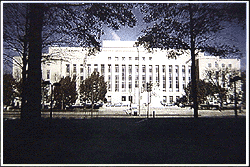US Court of Appeals

Dr. Roger C. S. Lin et. al. v. United States of America
US Court of Appeals
District of Columbia Circuit
333 Constitution Ave., NW,
Washington, D.C. 20001
|
filed: March 31, 2008
Oral Arguments: February 5, 2009

Summary of the fundamental legal rationale for the Court Case
(1) The Republic of China was entrusted with authority over Formosa and the Pescadores (hereinafter "Taiwan") as agent for the Allied Powers. This arrangement was specified in General Order No. 1 of Sept. 2, 1945. Such trust on behalf of the Allied Powers remains in effect today. Nothing in the post-war San Francisco Peace Treaty (SFPT) nor in any other treaty ever executed by or between the Republic of China (ROC) and the other Allied Powers has altered this administrative arrangement.
(2) Defendant United States of America is and remains the "principal occupying Power" of Taiwan under SFPT Article 23(a).
(3) By way of historical background, following the 1895 Treaty of Shimonoseki, Japan exercised sovereignty over Taiwan and held title to its territory.
(4) The United States entered the Pacific War against Japan on Dec. 8, 1941. The Allied Powers defeated Japan, and it surrendered on Sept. 2, 1945.
(5) Following the acceptance of the surrender of Japanese forces in Taiwan by the representatives of the ROC's Chiang Kai-shek (CKS), Taiwan remained de jure Japanese territory. The ROC government occupied Taiwan on behalf of the Allied Powers (led by the United States) pending a peace treaty with Japan, which would change the legal status of Taiwan.
(6) Pursuant to the SFPT, Japan renounced its sovereignty over Taiwan and title to its territory. Article 2(b) of the SFPT provided, "Japan renounces all right, title and claim to Formosa and the Pescadores."
(7) China never became a party to the SFPT. Neither the ROC government, which occupied the island of Taiwan as agent for the "principal occupying Power," nor the government of the People's Republic of China ("PRC"), which controlled mainland China, signed, ratified, or adhered to the SFPT.
(8) Article 25 of the SFPT specifically provided that the Treaty did "not confer any rights, titles or benefits on any State which [was] not an Allied Power [as defined in Article 23(a),]" subject to certain narrow exceptions set forth in Article 21. Accordingly, China, a non-party, did not receive "any right, titles or benefits" under the SFPT except as specifically provided in Article 21.
(9) Specifically, China, a non-party, was not entitled to any benefits under Article 2(b) dealing with the territory of Taiwan. The parties to the SFPT chose not to give any "right, title [or] claim to Formosa and the Pescadores" to China.
(10) While Article 2(b) of the SFPT did not designate a recipient of "all right, title and claim to Formosa and the Pescadores," Article 23(a) of the SFPT designated the United States as "the principal occupying Power" with respect to the territories covered by the SFPT, including "Formosa and the Pescadores."
(11) The United States' status as "principal occupying Power" of Taiwan has resulted from the World War II defeat of Japan by the United States, including the United States' conquest of Taiwan, and subsequent United States military government jurisdiction over Taiwan, which is further substantiated by SFPT Article 4(b) confirming the validity of United States Military Government directives pertaining to Taiwan.
(12) Following the entry into force of the SFPT, the government of the ROC continued to occupy Taiwan as agent for the United States, "the principal occupying Power."
(13) The Treaty of Peace between the ROC and Japan, which was signed on April 28, 1952, and entered into force on August 5, 1952 (the "Treaty of Taipei"), did not transfer sovereignty over Taiwan from Japan to China either. The late Secretary of State Dulles, in a press conference held on December 1, 1954, reiterated "that technical sovereignty over Formosa and the Pescadores has never been settled" and that "the future title is not determined by the Japanese peace treaty, nor is it determined by the peace treaty which was concluded between the Republic of China and Japan."
(14) The SFPT did not terminate the agency relationship between the United States, the principal, and the ROC, the agent, with regard to the occupation and administration of Taiwan.
(15) Following the entry into force of the SFPT on April 28, 1952, the ROC did not exercise sovereignty over Taiwan and did not have title to its territory.
(16) The form of administration by which an occupying power exercises government authority over occupied territory is called "military government." For a territorial cession in a peace treaty after war, the military government of the (principal) occupying power does not end with the coming into force of the peace treaty, but continues until legally supplanted by a recognized civil government for the area.
(17) From 1952 to the present, Taiwan has been an occupied territory and quasi-trusteeship of the United States, "the principal occupying Power." Currently, Taiwan is an occupied territory and quasi-trusteeship of the United States, and Taiwan's statehood status is disputed and uncertain. Neither the SFPT nor the Treaty of Taipei nor any other subsequent legal instruments after 1952 changed the status of Taiwan.
(18) The United States as the principal occupying Power is still holding the sovereignty over Taiwan and title to its territory in trust for the benefit of the Taiwanese people. The occupying Power never transferred the sovereignty over Taiwan or title to its territory to any other government.
(19) The international community does not recognize Taiwan as a state.
(20) On October 25, 2004, United States Secretary of State Colin Powell confirmed the United States' continuing policy towards Taiwan. He stated, "Taiwan is not independent. It does not enjoy sovereignty as a nation, and that remains our policy, our firm policy."

(21) RELIEF REQUESTED: Considering that the judicial branch has the authority and obligation to preserve the Constitutional rights of persons subject to the jurisdiction of the United States, whether or not such persons are United States citizens, non-citizen nationals, or aliens, Plaintiffs/Appellants respectfully pray that the Court enter an Order declaring that:
Plaintiffs/Appellants, by virtue of living in a territory subject to the jurisdiction of the United States,
* have fundamental rights under United States laws, including the United States Constitution.
* have the Fifth Amendment right and Fourteenth Amendment right against deprivation of life, liberty, or property, without due process of law.
* have the Eighth Amendment right against cruel and unusual punishment, including deprivation of a recognized nationality and being "stateless."
* have the First Amendment right to petition the government for a redress of grievances.
* have the Fourteenth Amendment right of equal protection of the laws, etc.
* may not be deprived of the Fifth Amendment right to travel (including the right to apply for a passport) without due process of law, which requires a notice and a hearing.
|



